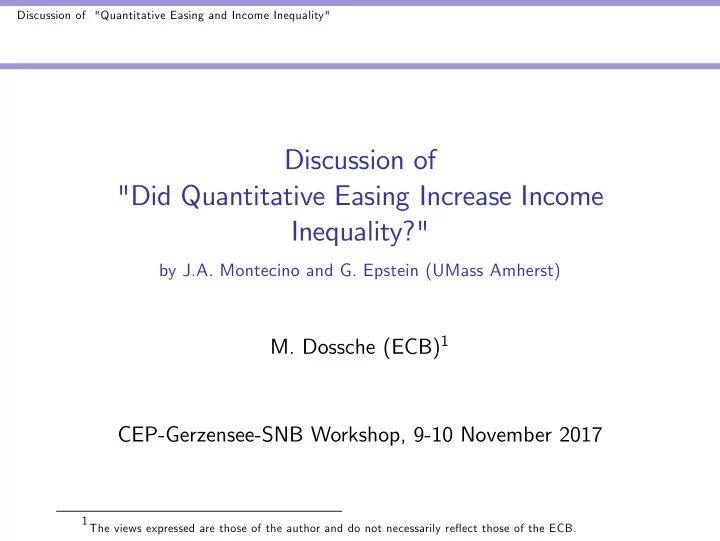

Discussion of "Quantitative Easing and Income Inequality" Discussion of "Did Quantitative Easing Increase Income Inequality?" by J.A. Montecino and G. Epstein (UMass Amherst) M. Dossche (ECB) 1 CEP-Gerzensee-SNB Workshop, 9-10 November 2017 1The views expressed are those of the author and do not necessarily reflect those of the ECB.
Discussion of "Quantitative Easing and Income Inequality" What the paper does Research question/related literature Research question � Has quantitative easing (QE) increased income inequality? � Three channels: � Employment channel (lower unemployment of the poor) � Asset appreciation and return channel (higher financial returns for the rich) � Mortgage refinancing channel (lower interest payments for the rich) � Related literature: Coibon et al. (2012), Gornemann et al. (2012), Adam and Tzamourani (2016), Lenza and Slacalek (2017).
Discussion of "Quantitative Easing and Income Inequality" What the paper does Data/method/findings Data/method/findings � Survey of Consumer Finances (SCF): 2010 (pre-QE) and 2013 (post-QE) vintages � Firpo et al. (2007): Recentered Influence Function (RIF) regressions & Oaxaca-Blinder decomposition � Decomposition of the change in income inequality from: 1. Employment 2. Financial returns 3. Mortgage refinancing � Identification of contribution of QE via 1 and 2 � Paper concludes that QE increased income inequality
Discussion of "Quantitative Easing and Income Inequality" Comments #1: Income measure Unconventional income measure � Net income = wages + interest + business + transfers + capital gains - debt payments � Paper states that: � business stands for income from owning a controlling share or running a business � capital gains stand for realized capital gains on financial assets � What about rental income and capital gains from housing? Included in X5712 and X5714!
Discussion of "Quantitative Easing and Income Inequality" Comments #1: Income measure - evidence from the euro area Adam and Tzamourani (2016)
Discussion of "Quantitative Easing and Income Inequality" Comments #1: Income measure Unconventional income measure � Alvaredo et al. (2017): � Distributional National Accounts: measure the extent to which different social groups benefit from growth. � Disposable income, which could also be labeled "personal disposable income", is equal to the sum of all income flows accruing to individuals, after taking into account the operation of the tax and transfer system. � Most [income] series were constructed by using some kind of "fiscal income" concept , i.e., total income that is or should be reported on income tax declarations � Realised capital gains underestimate impact of QE on more illiquid assets (e.g. housing, business wealth) � Guvenen and Kaplan (2017) use total income excluding capital gains
Discussion of "Quantitative Easing and Income Inequality" Comments #2: Impact of QE - endogeneity Endogeneity of QE � RIF regressions are reduced form � Issue: identification of impact of QE on inequality � Isolating impact of QE via: � Excluding bond returns, mortgage refinancing � Assumptions about relative impact of QE on employment and equity prices � Not clear whether impact of QE can be identified in this way � Comparison of impact via flow (employment) vs. stock (equity prices) variable seems unwarranted (cf. income vs. wealth distribution)
Discussion of "Quantitative Easing and Income Inequality" Comments #2: Impact of QE - evidence from the euro area Lenza and Slacalek (2017)
Discussion of "Quantitative Easing and Income Inequality" Comments #2: Impact of QE - evidence from the euro area Lenza and Slacalek (2017)
Discussion of "Quantitative Easing and Income Inequality" Wrapping up Conclusion � Nice decomposition of change in income distribution using RIF method � Helps to understand drivers of change in income distribution � Paper concludes that QE increased income inequality � Findings seem affected by: � Choice of income measure � Identification of QE impact
Discussion of "Quantitative Easing and Income Inequality" Background Lenza and Slacalek (2017)
Recommend
More recommend